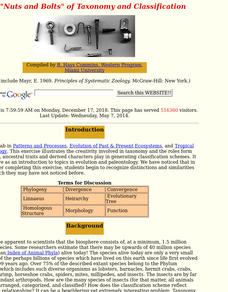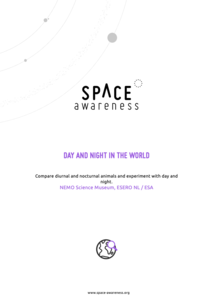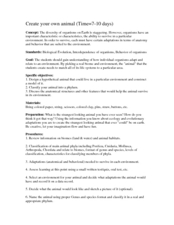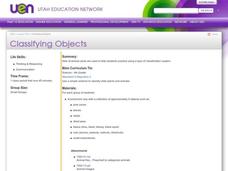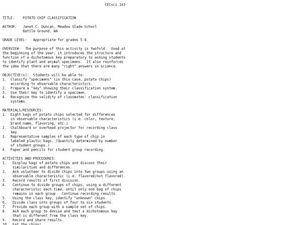Curated OER
Classy
Students explore the classification system in this seven lessons unit. The diversity of life forms and their characteristics are examined using a microscope. Kingdoms, classes, and families are investigated.
University of Wisconsin
Bimodel Botany Bouquet
Gardeners are given an individual plant specimen from a bouquet of local rain garden plants. They group up by their plant type and then make observations together, name the plant, and introduce it to the rest of the class. You then share...
Curated OER
Six Kingdom System of Classification
In this classification worksheet, students complete a graphic organizer comparing and contrasting the characteristics of the 6 different kingdoms.
Curated OER
Invertebrate Classification
Students discuss the recent disovery of the "furry lobster" to peak interest in the animal kingdom. They classify various speciments using invertebrate dichotomous keys, identifying major animal phyla and classes. Thy the complete the...
Curated OER
Scavenger Hunt: A Group Collection
Young scholars be complete a collection of living organisms and systems from the school campus.
Curated OER
Classifying Organisms within Kingdoms
High schoolers examine animal kingdom classifications. They discuss how animals are placed into kingdom classifications and compare similarities and differences of animals within a kingdom.
National Nanotechnology Infrastructure Network
Biology Reference Sheet
First year life science or biology pupils will appreciate this all-inclusive reference page. It provides a diagram of both a plant and an animal cell, the metric system prefixes, classification levels, definitions for cell processes, the...
Curated OER
Animals and Humans
Students identify the functions of various body parts. They participate in the "Head, Shoulders, Knees, and Toes" song, draw a picture of themselves and other mammals, and create a traced outline of their body that they add features to....
Curated OER
Life Cycle: Diversity in a Balance 4th Grade Workbook
In this life cycle workbook, 5th graders examine plant and animal cells, classification of organisms, human biology, photosynthesis, and natural environments. 21 different activities make up the Life Cycle Workbook.
Curated OER
Living Things
Alive or not? After viewing this presentation, life science learners will know how to answer this question. They are introduced to the seven processes of living systems and the classification hierarchy. Because it only covers...
Curated OER
What's the Difference?
Students analyze the similarities in different species. This lesson is part of a multi-segmented unit on the diversity of life. In this segment, students classify shoes to mimic the scientific categories of the classification system.
Curated OER
Taxonomy and the World of Microorganisms and Viruses
In this taxonomy worksheet, students understand how organisms are classified using Linnaeus' system. Students classify organisms as either plant or animal. This worksheet has 24 fill in the blank and 6 matching questions.
Curated OER
The "Nuts and Bolts" of Taxonomy and Classification
Students develop classification scheme that meets the established rules of the Linnaean system. They write one page essay on classification choices.
Space Awareness
Day and Night in the World
How do different parts of the world experience day and night? Introduce scholars to the concept of global citizenship while teaching about animal behavior with discussion of nocturnal and diurnal animals. Then, learners complete...
Curated OER
Creative Classification
Students create an animal by using physical characteristics to classify that animal in the Linnaean Classification System. This lesson is part of a multi-segmented unit on the diversity of life.
Curated OER
Tackling Taxonomy
Students study physical characteristics of separate phyla and place them into similar groups. This lesson plan is part of a multi-segmented unit on the diversity of life. students develop a classification system by grouping animals into...
Curated OER
Create Your Own Animal
Students design and create their own hypothetical animal. In this biology lesson, students identify the factors organisms need to survive. They classify their animals according to its correct phylum.
Curated OER
Classifying Objects
Fourth graders work in small groups to sort and classify a variety of objects. They develop criteria for sorting and explain the characteristics they chose for classification. Groups record and share their classifications.
Curated OER
Science Jeopardy
Wow! Review an entire semester of biology curriculum playing this Science Jeopardy game! The variety of topics is extremely broad, so you will need to review each question to find if they all apply to your course. As you find material...
Lerner Publishing
Meet the Dinosaurs
Take your class of youngsters on a prehistoric adventure with this four-lesson series on dinosaurs. Accompanying the Meet the Dinosaurs books by Don Lessem, these lessons engage children in writing their own dinosaur books,...
Curated OER
Potato Chip Classification
Students classify specimens by observable characteristics. By classifying potato chips, they are introduced to the dichotomous key for identifying plant and animal specimens.
Curated OER
Stop the Bleeding
Students explore various parts of the heart and blood vessels . They begin with an overview of the components of the cardiovascular system. They see a cross section of an artery and watch how a blood clot develops.
Curated OER
Living On Earth
Students discover the many different animals within various habitats and discover how each individual species interacts with its particular environment. Through charting different animals and their distinct habitat and matching animals...
Curated OER
Diversity And Adaptations Of Organisms
Eighth graders study how and why animals are classified into eight groups in the animal kingdom. They work together to identify organisms. They use the key to determine the phylum for the included problems.














